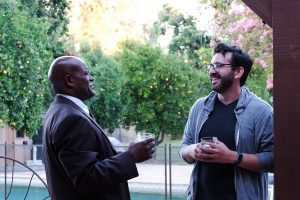
What is the greatest threat to human health? Guests at the Farm and Food event held at director Oz Scott’s house were prompted to consider that question by Ellen Silbergeld, a professor of environmental health sciences, epidemiology, and health policy and management at Johns Hopkins University. Silbergeld’s answer was not what you might expect.
“We’re at the doorway where we go back to the pre-antibiotic era,” warned Silbergeld, explaining that the widespread overuse of antibiotics is rapidly leading to the rise of drug-resistant bacteria. She estimated that by the year 2040 we will be facing pathogenic bacteria resistant to every antibiotic we have.
Many blame this looming crisis on doctors overprescribing antibiotics or patients lazily eschewing a full course of treatment. But Silbergeld countered these misconceptions with a shocking truth: major drug companies deliver 80 percent of their antibiotics to the agriculture industry.
Antibiotics were once believed to stimulate the growth of livestock, so they were added en masse to the feed for factory animals. But that science was later disproven, so companies like Pfizer and Merck pivoted: antibiotics in agriculture aided in the health and safety of farm animals. However, Silbergeld related her experience on a World Health Organization panel that debunked this claim. The panel’s study called out the drug companies responsible for dumping antibiotics into food for no reason, yet the study was almost immediately rejected by the U.S. Department of Agriculture (USDA).
Though she was initially shocked by the behavior of USDA, Silberg soon discovered a key piece of information that put this behavior into context: the legislation that created the department in the first place. USDA was founded not with the aim of protecting food, workers, or even American consumers, but rather “to promote U.S. agriculture.”
Silbergeld concluded her presentation with a single question: “How can we get people to understand how imminent this public health crisis is?”

Ellen Silbergeld and Jessica Fanzo
Silberg was joined on stage by Jessica Fanzo, director of the Global Food Ethics and Policy Program at Johns Hopkins University. Fanzo has worked for more than 15 years in sub-Saharan Africa and Asia to build equitable, ethical, and sustainable diets.
Fanzo began her talk by labeling malnutrition as a global burden. She offered several alarming statistics to back up her argument, most notably that 25 percent of the world’s children under age 5 are starved to the point of lifelong, irreversible cognitive impairment. Fanzo offered several possible reasons for this crisis, including societal factors like urbanization, restrictions in international food trade, and the social conflicts that “turn a hungry man into an angry man.”
Fanzo posed four questions to the room. One, is it possible to have human and planetary health together, and if so, what trade-offs would we as a species be willing to live with? Two, how can we create greater social equity and justice across the food system? Three, should governments be the stewards of the food system? And four, is it acceptable for us to eat poorly without penalty? None of these has an easy answer and Fanzo intended them as jumping-off points for those assembled to begin working toward solutions to a planetary food crisis.
Fanzo encouraged the guests to create change in their own environments, particularly in the choices they make as consumers. Fanzo implored everyone to use the power of purchase, because “when it comes to food, we have extraordinary weapons in terms or changing procedure.” She cited the rise in popularity of low-sugar foods, low-fat foods, and even skim milk as evidence that the food industry does respond to trends among consumers.
Why not use that same power to fight for more sustainable food systems that protect both human and planetary health?






